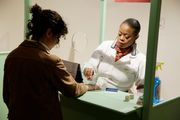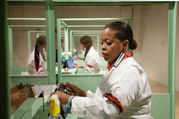EINAT AMIR
As Much As you Want, 2018
As part of a long term collaboration with The Emotion in Conflict lab at The Interdisciplinary Center Herzliya, the artist Einat Amir and the empathy researcher Yossi Hasson created a participatory performance combined with real-time psychological research. The project consisted of one-on-one conversations between performers and audience members, and was shown at Links Hall in Chicago, in Collaboration with Hyde Park Art Center, in May 2018.
Each performer was seated inside an “immigration booth”, designed by Amir, welcoming one visitor at a time for a 15-minute, one-on-one interview. The interviews were a mix of genuine psychological research and performance art, which mimicked the mechanism of the research, making them impossible to differentiate. This project contained a mix of questions and actions that challenged the audience both visually and emotionally. The anonymous data collected from the audience is being currently being developed into new research.
The scientific aim was to examine whether changing the perception that empathy is limited or unlimited could change the empathic experience of Americans toward Syrian refugees who entered the United States. To this end, 108 Americans participated in the project and were randomly assigned to either a limited or unlimited condition. In the limited condition, participants were asked to rate their capacity of empathy on a short scale from 0 (cannot empathize with anyone) to 3 (can empathize with 3 people). In the unlimited condition, participants were asked to rate on a larger scale of 0 to 300. Since people tend to rate their positive traits above average, this self-rating lead to the perception that empathy is limited or unlimited respectively. Following that, participants were introduced with four real stories of Syrian refugees who were tortured in their homeland. After each story, participants indicated their level of empathy and willingness to help them. We found that across all stories, participants in the unlimited conditions felt more empathy toward the refugees and were more willing to read more about their full stories, when compared with participants in the limited conditions.







